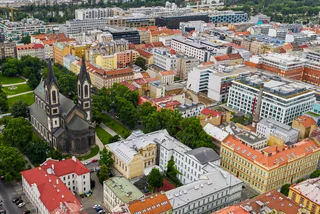Prague City Hall is looking at raising taxi prices for the first time in 13 years. The highest possible price per kilometer should be increased from CZK 28 to CZK 36 crowns, the starting rate would rise from CZK 40 to CZK 60 and a minute waiting would rise from CZK 6 to CZK 7.
The draft regulation also would change conditions for hotel taxis and luxury carriers as well as alternative taxi operators, such as Uber. The proposal is currently in the comment phase, meaning people can still suggest changes.
“The prices
haven’t changed in roughly 13 years, and we had to recalculate what
taxi prices should look like. According to this, we made the
regulation,” Deputy Mayor Adam Scheinherr (Praha sobě),
responsible for transit issues, said, according to press reports.
The proposed increase was calculated on the basis of the annual cost of operating a taxi and the money a driver can earn. According to these calculations, the average driver of a Škoda Octavia would earn almost CZK 30,000 a month at these prices. So far, he or she could only get 17,000 a month, according to an explanatory memorandum from City Hall.
Taxi drivers have
been complaining that with no increase in rates and competition from
alternative ride services, they have been unable to make a living.
Taxis representatives welcome the increase. “Generally, it corresponds to the fact that for 13 years the price did not move, and the increase corresponds to inflation,” AAA Radiotaxi owner Jiří Kvasnička said, adding that the new prices are in line with the European average.
The regulation also
foresees a change in the conditions for hotel taxis and luxury
limousines. Now, these have an exception and can charge a higher
price if it is agreed upon in advance by contract. The regulation may
also affect operators of alternative taxis.
According to the city, the alternative carriers are abusing the exemption, and getting around the obligation to mark vehicles with a lamp and use a taximeter. Some of app-based ride sharing services have fares exceeding the set rates per kilometer, but the customer approves the exact price before boarding the car.
“However, these
entities do not have any added value compared to a classic taxi
service that would entitle these operators to increase prices and to
exceed the city’s maximum,” the city said in its explanatory
memorandum.
Deputy Mayor Adam
Scheinherr said services such as Uber or Bolt should still be
required to use meters and hood lamps. Bolt’s manager for Central
Europe, Roman Sysl, said that requiring meters and hood lamps would
have a negative impact on both the ride services and the public.
The conflict between taxis and ride services has led to several strike actions about unfair competition. The biggest protest was in October 2017 at Václav Havel Airport Prague. In March 2018, the Czech government agreed with Uber on basic operating rules. Prague City Hall, at that time led by Mayor Adriana Krnáčová (ANO), agreed to expand testing and issuing of licenses.
Prague’s taxi
drivers have long had a bad reputation for overcharging and other
abuses. Earlier this year in May, a taxi driver charged a newly
arrived tourist couple CZK 8,700 for a trip from Václav Havel
Airport Prague to a Prague 5 hotel. The trip should have cost some
CZK 550. Police managed to get the driver to return the money, and
started administrative proceedings.
The current City Hall administration is canceling the remaining Fair Place taxi stands due in part to abuse. Previous City Hall administrations have tried to tackle the issue of overcharging. In April 2017 signs were put up near popular tourist spots to warn people against taking standing cabs and informing people of the proper rates. One sign warned that taxi drivers often charge more than 10 times the official rate, making it one of the highest in Europe.
In 2015, the Czech
News Agency reported that one in three taxi drivers overcharged,
based on spot checks made by city inspectors.
In January 2005
then-mayor Pavel Bém dressed up as an Italian tourist and was
charged 500 percent of the official rate for a short trip to Prague
Castle. In another cab, he was charged double for paying in euros.












 Reading time: 3 minutes
Reading time: 3 minutes 

 English
(Proficient)
English
(Proficient)





















